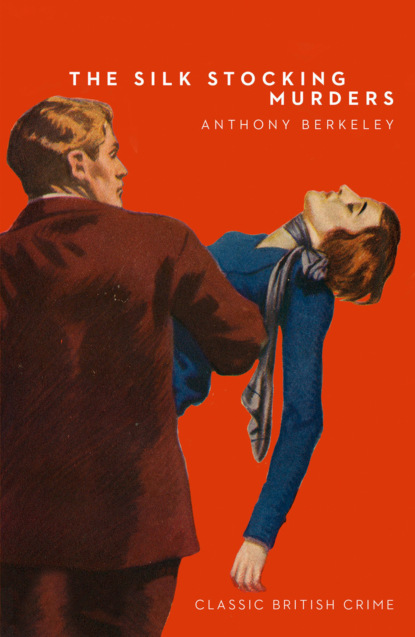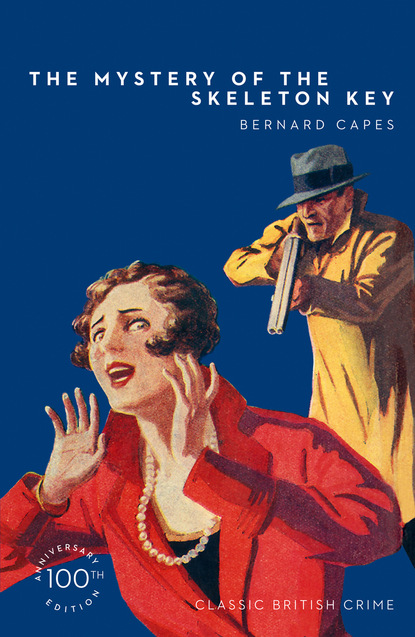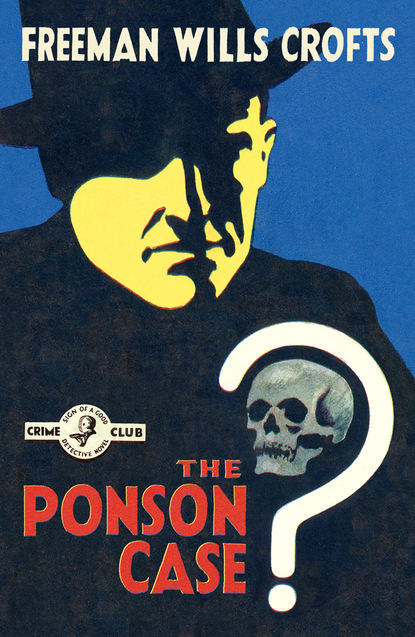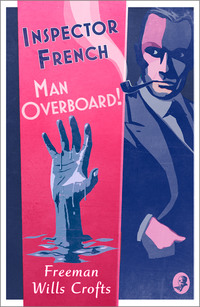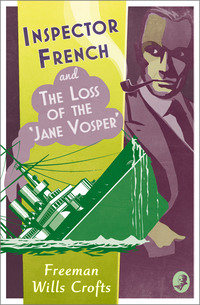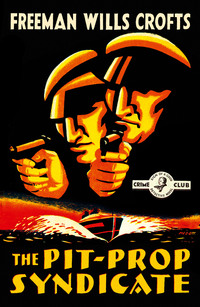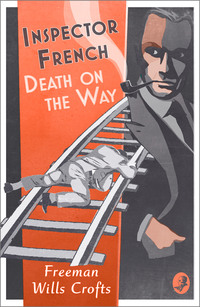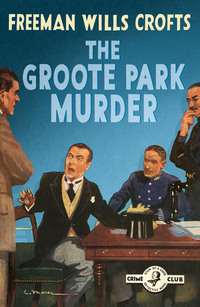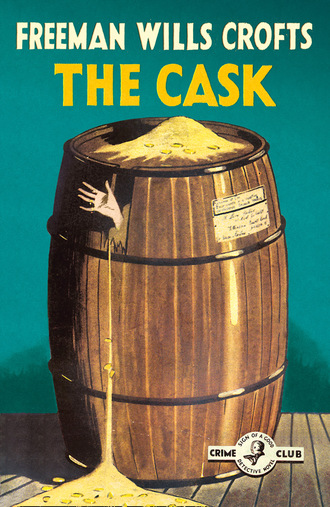
Полная версия
The Cask
At first he saw nothing out of the common, but on retracing his steps he noticed, about three yards from the gate, two faint marks of mud or dust on the plaster. These were some six feet from the ground and about fifteen inches apart. On the soft soil which had filled in between the cobble stones in this disused part of the yard, about a foot from the wall and immediately under these marks, were two sharp-edged depressions, about two inches long by half an inch wide, arranged with their longer dimensions in line. Someone had clearly used a short ladder.
Inspector Burnley stood gazing at the marks. It struck him they were very far apart for a ladder. He measured the distance between them and found it was fifteen inches. Ladders, he knew, are about twelve.
Opening the gate he went to the outside of the wall. A grass plot ran alongside it here and the Inspector, stooping down, searched for corresponding marks. He was not disappointed. Two much deeper depressions showed where the ends of the ladder-like apparatus had sunk into the softer ground. These were not narrow like those in the yard, but rectangular and of heavier stuff, three inches by two, he estimated. He looked at the plaster on the wall above, but it was not till he examined it through his lens that he was satisfied it bore two faint scratches, corresponding in position to the muddy marks on the opposite side.
A further thought struck him. Scooping up a little soil from the grass, he went again into the yard and compared with his lens the soil and the dry mud of the marks on the plaster. As he had anticipated, they were identical.
He could now dimly reconstruct what had happened. Some one had placed a peculiar kind of ladder against the outside of the wall and presumably crossed it and opened the gate. The ladder had then been carried round and placed against the inside of the wall, but, probably by accident, opposite end up. The outside plaster was therefore clean but scraped, while that on the inside bore traces of the soil from the ends that had stood on the grass. In going out after barring the gate, he imagined the thief had pulled the ladder after him with a cord and passed it over the wall.
The Inspector returned to the grass and made a further search. Here he found confirmation of his theory in a single impression of one of the legs of the ladder some two feet six out from the wall. That, he decided, had been caused by the climber throwing down the ladder when leaving the yard. He also found three footmarks, but, unfortunately, they were so blurred as to be valueless.
He took out his notebook and made a sketch with accurate dimensions showing what he had learnt of the ladder—its length, width, and the shape of the legs at each end. Then bringing out the steps Felix had used to hang the chain blocks, he got on the wall. He examined the cement coping carefully, but without finding any further traces.
The yard being paved, no wheel or foot marks were visible, but Burnley spent quite a long time crossing and recrossing it, examining every foot of ground in the hope of finding some object that had been dropped. Once before, in just such another case, he had had the luck to discover a trouser button concealed under some leaves, a find which had led to penal servitude for two men. On this occasion he was disappointed, his search being entirely unsuccessful.
He went out on the drive. Here were plenty of marks, but try as he would he could make nothing of them. The surface was covered thickly with fine gravel and only showed vague disturbances with no clear outlines. He began methodically to search the drive as he had done the yard. Every foot was examined in turn, Burnley gradually working down towards the gate. After he left the immediate neighbourhood of the house the gravel became much thinner, but the surface below was hard and bore no marks. He continued perseveringly until he got near the gate, and then he had some luck.
In the lawn between the house and the road some work was in progress. It seemed to Burnley that a tennis or croquet ground was being made. From the corner of this ground a recently filled in cut ran across the drive and out to the hedge adjoining the lane. Evidently a drain had just been laid.
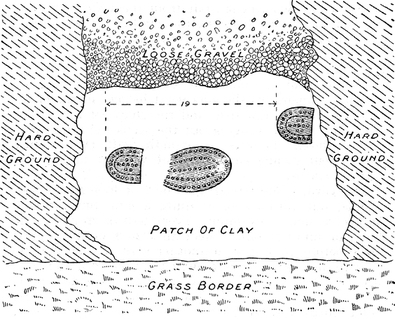
Where this drain passed under the drive the newly filled ground had slightly sunk. The hollow had been made up in the middle with gravel, but it happened that a small space on the lane side which had not gone down much was almost uncovered, the clay showing through. On this space were two clearly defined footmarks, pointing in the direction of the house.
I have said two, but that is not strictly correct. One, that of a workman’s right boot with heavy hobnails, was complete in every detail, the clay holding the impression like plaster of Paris. The other, some distance in front and to the left and apparently the next step forward, was on the edge of the clay patch and showed the heel only, the sole having borne on the hard.
Inspector Burnley’s eyes brightened. Never had he seen better impressions. Here was something tangible at last. He bent down to examine them more closely, then suddenly sprang to his feet with a gesture of annoyance.
‘Fool that I am,’ he growled, ‘that’s only Watty bringing up the cask.’
All the same he made a careful sketch of the marks, showing the distance between them and the size of the clay patch. Watty, he felt sure, would be easy to find through the carting establishment, when he could ascertain if the footsteps were his. If it should chance they were not, he had probably found a useful clue to the thief. For the convenience of the reader I reproduce the sketch.
Burnley turned to go on, but his habit of thinking things out reasserted itself, and he stood gazing at the marks and slowly pondering. He was puzzled that the steps were so close together. He took out his rule and re-measured the distance between them. Nineteen inches from heel to heel. That was surely very close. A man of Watty’s size would normally take a step of at least thirty inches, and carters were generally long-stepping men. If he had put it at thirty-two or thirty-three inches he would probably be nearer the thing. Why, then, this short step?
He looked and pondered. Then suddenly a new excitement came into his eyes and he bent swiftly down again.
‘Jove!’ he murmured. ‘Jove! I nearly missed that! It makes it more like Watty and, if so, it is conclusive! Absolutely conclusive!’ His cheek was flushed and his eyes shone.
‘That probably settles that hash,’ said the evidently delighted Inspector. He, nevertheless, continued his methodical search down the remainder of the drive and out on to the road, but without further result.
He looked at his watch. It was seven o’clock.
‘Two more points and I’m through,’ he said to himself in a satisfied tone.
He turned into the lane and walked slowly down it, scrutinising the roadway as he had done the drive. Three separate times he stopped to examine and measure footmarks, the third occasion being close by the little gate in the hedge.
‘Number one point done. Now for number two,’ he muttered, and returning to the entrance gate stood for a moment looking up and down the road. Choosing the direction of London he walked for a quarter of a mile examining the gateways at either side, particularly those that led into fields. Apparently he did not find what he was in search of, for he retraced his steps to where a cross road led off to the left and continued his investigations along it. No better luck rewarding him, he tried a second cross road with the same result. There being no other cross roads, he returned to the lane and set out again, this time with his back to London. At the third gateway, one leading into a field on the left-hand side of the road, he stopped.
It was an ordinary iron farm gate set in the rather high and thick hedge that bounded the road. The field was in grass and bore the usual building ground notice. Immediately inside the gate was a patch of low and swampy looking ground, and it was a number of fresh wheel marks crossing this patch that had caught the Inspector’s attention.
The gate was not padlocked, and Burnley slipped the bolt back and entered the field. He examined the wheel marks with great care. They turned sharply at right angles on passing through the gate and led for a short distance along the side of the fence, stopping beside a tree which grew in the hedge. The hoof marks of a horse and the prints of a man’s hobnailed boots leading over the same ground also came in for a close scrutiny.
It was a contented looking Burnley that turned out of the field and walked back to St Malo. He was well satisfied with his night’s work. He had firstly succeeded in getting a lot of information out of Felix, and had further turned the latter into a friend anxious to help in the clearing up of the mystery. And though an unexpected check had arisen in the disappearance of the cask, he felt that with the information he had gained in the last three hours it would not be long before he had his hands on it again.
As he approached the door Felix hailed him.
‘I saw you coming up,’ he said. ‘What luck?’
‘Oh, not so bad, not so bad,’ returned the other. ‘I’m just going back to the city.’
‘But the cask? What about it?’
‘I’ll start some inquiries that may lead to something.’
‘Oh, come now, Inspector, don’t be so infernally close. You might tell me what you’ve got in your mind, for I can see you have something.’
Burnley laughed.
‘Oh, well,’ he said, ‘I don’t mind. I’ll tell you what I found; you see what you make of it.
‘First, I found your coach-house padlock had been forced with a lever. There was nothing of the kind lying about, therefore whatever theory we adopt must account for this lever’s production and disposal. It may quite likely bear marks corresponding to those on the padlock, which evidence might be valuable.
‘I then found that your visitor had arrived at the yard gate with a vehicle and had climbed the wall with the aid of a very peculiar ladder. He had, presumably, opened the gate and, after loading up the cask and drawing his vehicle out on to the drive, had closed the gate, leaving by the same means. There is evidence to show that he lifted the ladder over after him, probably pulling it up by a cord.
‘I have said the ladder was a peculiar one. Here is a sketch of its shape so far as I could learn it. You will see that it is short and wide with the ends shaped differently.
‘I may remind you, in passing, how easy it would have been to load up the cask in spite of its weight. All that was necessary was to back the vehicle under it and lower out the differential pulley, a thing a man could do with one hand.
‘I examined the drive, but could find nothing except at one place where there was a most interesting pair of footmarks. You must really see these for yourself, and if you will stroll down now I will point them out. There is reason to believe they were made by Watty when he was approaching the house with the dray, but I cannot be positive as yet.
‘I then examined the lane and I found in three places other footmarks by the same man. Finally, about 200 yards along the main road to the north, I found wheel marks leading into a grass field beside which he had walked.
‘Now, Mr Felix, put all these things together. You will find them suggestive, but the footmarks on the drive are very nearly conclusive.’
They had by this time reached the marks.
‘Here we are,’ said Burnley. ‘What do you think of these?’
‘I don’t see anything very remarkable about them.’
‘Look again.’
Felix shook his head.
‘See here, Mr Felix. Stand out here on the gravel and put your right foot in line with this first print. Right. Now take a step forward as if you were walking to the house. Right. Does anything occur to you now?’
‘I can’t say that it does, unless it is that I have taken a very much longer step.’
‘But your step was of normal length.’
‘Well then, conversely, the unknown must have taken a short one.’
‘But did he? Assume it was Watty, as I think it must have been. You were with him and you saw him walking.’
‘Oh, come now, Inspector. How could I tell that? He didn’t normally take very short steps or I should have noticed it, but I couldn’t possibly say that he never took one.’
‘The point is not essential except that it calls attention to a peculiarity in the steps. But you must admit that while possible, it is quite unlikely he would take a step of that length—nineteen inches as against a probable thirty-three—without stumbling or making a false step.’
‘But how do you know he didn’t stumble?’
‘The impression, my dear sir, the impression. A false step or a stumble would have made a blurred mark or shown heavier on one side than the other. This print shows no slip and is evenly marked all over. It was clearly made quite normally.’
‘That seems reasonable, but I don’t see how it matters.’
‘To me it seems exceedingly suggestive though, I agree, not conclusive. But there is a nearly conclusive point, Mr Felix. Look at those prints again.’
‘They convey nothing to me.’
‘Compare them.’
‘Well, I can only compare the heels and there is not much difference between them, just as you would expect between the heels of a pair of boots.’ Felix hesitated. ‘By Jove! Inspector,’ he went on, ‘I’ve got you at last. They’re the same marks. They were both made by the same foot.’
‘I think so, Mr Felix; you have it now. Look here.’ The Inspector stooped. ‘The fourth nail on the left hand side is gone. That alone might be a coincidence, but if you compare the wear of the other nails and of the leather you will see they are the same beyond doubt.’
He pointed to several little inequalities and inaccuracies in the outline, each of which appeared in both the marks.
‘But even if they are the same, I don’t know that I see what you get from that.’
‘Don’t you? Well, look here. How could Watty, if it was he, have produced them? Surely only in one of two ways. Firstly, he could have hopped on one foot. But there are three reasons why it is unlikely he did that. One is that he could hardly have done it without your noticing it. Another, that he could never have left so clear an impression in that way. The third, why should he hop? He simply wouldn’t do it. Therefore they were made in the second way. What was that, Mr Felix?’
Felix started.
‘I see what you’re after at last,’ he said. ‘He walked up the drive twice.’
‘Of course he did. He walked up first with you to leave the cask. He walked up the second time with the empty dray to get it. If the impressions were really made by Watty that seems quite certain.’
‘But what on earth would Watty want with the cask? He could not know there was money in it.’
‘Probably not, but he must have guessed it held something valuable.’
‘Inspector, you overwhelm me with delight. If he took the cask it will surely be easy to trace it.’
‘It may or it may not. Question is, are we sure he was acting for himself.’
‘Who else?’
‘What about your French friend? You don’t know whom he may have written to. You don’t know that all your actions with the cask may not have been watched.’
‘Oh, don’t make things worse than they are. Trace this Watty, won’t you?’
‘Of course we will, but it may not be so easy as you seem to think. At the same time there are two other points, both of which seem to show he was at least alone.’
‘Yes?’
‘The first is the watcher in the lane. That was almost certainly the man who walked twice up your drive. I told you I found his footmarks at three points along it. One was near your little gate, close beside and pointing to the hedge, showing he was standing there. That was at the very point my man saw the watcher.
‘The second point concerns the horse and dray, and this is what leads me to believe the watcher was really Watty. If Watty was listening up the lane where were these? If he had a companion the latter would doubtless have walked them up and down the road. But if he was alone they must have been hidden somewhere while he made his investigations. I’ve been over most of the roads immediately surrounding, and on my fourth shot—towards the north, as I already told you—I found the place. It is fairly clear what took place. On leaving the cask he had evidently driven along the road until he found a gate that did not lead to a house. It was, as I said, that of a field. The marks there are unmistakable. He led the dray in behind the hedge and tied the horse to a tree. Then he came back to reconnoitre and heard you going out. He must have immediately returned and brought the dray, got the cask, and cleared out, and I imagine he was not many minutes gone before my man Walker returned. What do you think of that for a working theory?’
‘I think it’s conclusive. Absolutely conclusive. And that explains the queer-shaped ladder.’
‘Eh, what? What’s that you say?’
‘It must have been the gangway business for loading barrels on the dray. I saw one hooked on below the deck.’
Burnley smote his thigh a mighty slap.
‘One for you, Mr Felix,’ he cried, ‘one for you, sir. I never thought of it. That points to Watty again.’
‘Inspector, let me congratulate you. You have got evidence that makes the thing a practical certainty.’
‘I think it’s a true bill. And now, sir, I must be getting back to the Yard.’ Burnley hesitated and then went on: ‘I am extremely sorry and I’m afraid you won’t like it, but I shall be straight with you and tell you I cannot—I simply dare not—leave you without some kind of police supervision until this cask business is cleared up. But I give you my word you shall not be annoyed.’
Felix smiled.
‘That’s all right. You do your duty. The only thing I ask you is to let me know how you get on.’
‘I hope we’ll have some news for you later in the day.’
It was now shortly after eight, and the car had arrived with the two men sent back the previous evening. Burnley gave them instructions about keeping a watch on Felix, then with Sergeant Hastings and Constable Walker he entered the car and was driven rapidly towards London.
Конец ознакомительного фрагмента.
Текст предоставлен ООО «ЛитРес».
Прочитайте эту книгу целиком, купив полную легальную версию на ЛитРес.
Безопасно оплатить книгу можно банковской картой Visa, MasterCard, Maestro, со счета мобильного телефона, с платежного терминала, в салоне МТС или Связной, через PayPal, WebMoney, Яндекс.Деньги, QIWI Кошелек, бонусными картами или другим удобным Вам способом.


